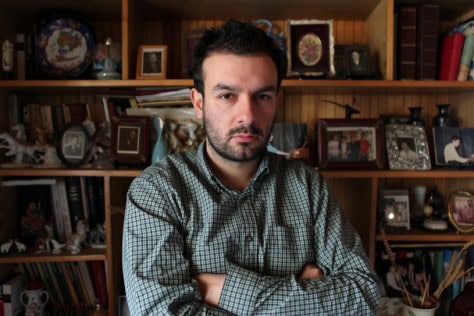If you’ve been in American Apparel in the last year or so (and I know you have, you sneaky hipster, you), you’ve probably noticed the rack at the cash register with the vinyl record. Well—really you’ve probably noticed the breasts printed on the record’s cover, and the body, female, of course, that the breasts are attached to, and likely the pubic hair shadow between the legs—and then, maybe, you also noticed the miniature horse, standing atop one breast, and the white-suited man, also miniature, atop the horse, staring, glumly, into the hazy sunset. And—if you weren’t too hasty buying your lamé jacket—you may have even noticed the name of the album (Sexuality) and the artist: Sébastien Tellier.
Tellier’s relaxed luxury-pop has been well-known in certain circles for a while—his track “Ritournelle,” has shown up on more than one DJ’s 5 AM comedown setlist—but Sexuality, his third album, is something of a breakthrough. Tellier chalks it up to working with producer Guy Manuel de Homem-Christo (the gold robot in Daft Punk), and there’s something to be said about the way Homem-Christo has gotten Tellier to reign in his worst excesses. But in the end, it’s Tellier’s force of personality and full-on commitment to his project (an album about, of, and for sex) that holds Sexuality together. The album—decadent, funny and lush—stands as much as a monument to Tellier, and his exuberant white-suited image, as it does to the music, an effect not uncommon among iconic—and iconoclastic—French pop stars, from Serge Gainsbourg to Johnny Hallyday. And though he doesn’t sound very much like them, Sébastien shares with his Gallic forebears that uniquely French ability to skirt the line between unbearably cool and unbelievably corny and emerge unscathed. Tellier may not have attained that kind of legend, but listening to Sexuality gives you the sense that it’s only a matter of time.
Tellier will embark on his North American tour in New York tonight, working his way across the continent before performing at Coachella in mid-April. We got him on the phone last week and talked to him about the three G’s—God, Guy-Man and Gene Clark.
Your last two albums have both been centered around big themes—“politics” and “sexuality.” Why do you write your albums like that?
Because when I was a kid, a child, my parents was very fond of rock progressive music, like Pink Floyd, King Crimson, you know, this kind of band. And so it was always a conceptual album—conceptual? Is it OK? Concept album. And now because it was always on, this kind of music, so now, for me, an album non-conceptual, a non-conceptual album, for me, it’s like a compilation, you know, in my ear. And so that’s my style, for me, an album, a record, it’s like a book, or a movie. I need a beginning; I need an end; I need surprise; I need to laugh; I need to cry. Anything like in a book or a movie, with a real story inside the records, so that’s why I chose a big theme—to say, “I make concept album.”
How do you prepare to write a thematic concept album?
For me it was, I have a kind of quest through my music. I want to know, because, I have always said, I feel like a puppet, and I see people around me as puppets too, and so I try to know who is the master of puppets, you know? And my music tries to give an answer to that question, “Who is the master of puppets?” And so, for me, in the beginning of my question of the master of puppets was my family, family in general, so I am like that because my father was like that, and so on. And after that, that changed my mind; I say to myself, “Oh, in fact, what is the most important idea in the world? It’s politics.” Because I am what I am because I have this kind of place in the world, in the society, I work there or do that, and everything. And after that I changed my mind again to say to myself, “In fact, we are just slaves of our own sexuality, and everything is a question of sex.” And that’s why the album is about sex.
Do you know what theme you’ll choose next?
It’s very hard because sex for me was not just sexuality, or sex, for me, in the album, sex was life, and nothing is more important than life. So for me it’s really hard to go ahead of that—to create the following part of my music—because nothing is more important than life! So now, maybe, an album about God! [Laughs]. I don’t know, I don’t know, for me it’s a big problem because it’s really hard to find something more interesting.
Sexuality was the first time you’d worked with producers—Guy-Man from Daft Punk and DJ Rico. What was different about working with collaborators like that?
Now, it’s a new life for me, with producers; it’s a new musical life, because I really love to compose; I really love to write the lyrics. The real passion of my life is to compose. And after, to produce, it’s a kind of another world—because, you have to work; you have to choose a synthesizer, choose the sound of the synthesizer; you have cable, a lot of cable, a lot of computer things. It’s very complicated to produce a record. And maybe now I’m too in love with composition to produce again! Now I want to be just completely free just to create some ideas, and after I don’t want to work anymore—I just want to do what I really like to do. And in fact I was not so good a producer. It’s better like that. It’s always good to have another point of view, because that creates, like, a wedding of two spirits, between me and Guy-Man, and to talk about sex, it’s better to be two people than just one! [Laughs]. It’s like a wedding album—it’s a wedding about me and Guy-Man.
So you’d like to work with Guy-Man again?
Yes, why not! Because you know for me Guy-Man is the best producer in Europe, and he has a very good vision of the future of the music! I believe in his vision of the future of music, and it’s this kind of—I don’t need to talk to Guy-Man, you know? We are in studio, we work, but we don’t talk, just the silence of music, but no words, and it’s very comfortable to me, because I don’t like to explain when I am waiting in the studio, “Oh, more like that,” or “no, no, more like that.” I want to work in a direct way.
I’ve read that you’re a big Gene Clark fan, and that his music was a big influence on Sexuality.
You know, when you really love music, it’s not just music, it’s like philosophy, and step by step you love this record, and after that you are more intelligent, so you love another one better, and so step by step, it’s like a journey inside the music, and you drive through the record to reach the top idea, you know, something like that, it’s like the journey, the mountain, the love of music. And so to me, Gene Clark, it’s almost at the top the mountain in my trip, because step by step, after a lot of records, in fact this kind of music, this kind of voice, this kind of guitar and rhythm, it’s a very good philosophy—philosophic music, if you understand. You know, it’s a kind of goal. When you think a lot about music, Gene Clark, it’s a kind of goal; it’s a kind of conclusion. After all; you love rap; you love R ‘n B; you love everything else—when you love Gene Clark you become a kind of new—I don’t know the—a master. A quiet master.
Do you feel the same way about any other artists or records?
Yes, yes. Dennis Wilson with Pacific Ocean Blue. I really like… maybe you know of music from the Mamas and the Papas?
It’s interesting to hear you say that, because it seems like you often get placed with artists in the French electronic scene, who sound very different from the Mamas and the Papas. How do you see yourself fit with some of your French contemporaries?
For me, it’s—I’m more like in the poetry stuff, you know. I am not a producer so I don’t like music from producers, you know? Take Justice’s album—it’s a good band, but it’s a band of producers. There is not a real story inside. Me, I am more like—in fact, I don’t care about music. I care about the idea of the music, and I care about the message of the music, and the effect of the music, on the body, on the mind of the audience. And so I have maybe a more artistic vision of music than people in the new French electronic music. Because me, for example, when I make a record I don’t think about nightclubbing, or I don’t think that. I don’t care about dance, I don’t care about nightclub. I care about creating big emotion inside the ears of listeners.
You have a well-crafted image and a definite aesthetic associated with your music—is that part of the message of the music?
It’s very important, the image of the music, of course, but I try to—for me, what is really important is the record—is the music. After all around, I just want to have some fun, and some pleasure, and some beauty. Nothing really serious. Around the record it’s always like—for me when you make a very serious video clip, it’s not a good message. It’s a message of—what is important, this image, rich image—and so there is a message through my image, the message is: music is more important than this. To me, it’s always a pleasure to do that, but just to have fun. When you choose the cover of the album, it’s a time of pleasure; it’s not like work, you know. “Oh, yes, yes, it’s beautiful, OK.” Nothing special, you know, it’s not my obsession.
How does that play into your live shows? What do you expect from your audience?
I am wanting something from the U.S. audience, because, like I said, it’s true, I don’t want to listen to crap, so what’s important when I am playing on stage is to see some courage—and, like, maybe, last time, when I was in New York, a couple had sex in audience during the show. It was wonderful. And the best gift for me during the show, if you want to give me something, is to make love, during I play.
What’s next for you? What projects are coming up?
The tour in the U.S. of course, and after that I want to make a kind of break, and during the break I want to make a soundtrack for a movie. Because it’s very good to play soundtrack because you can record music without the pressure of an album—it’s just music for pleasure. It’s good to play music that way. So, yes, during the break, some soundtrack, and after that, the new album.
Do you know what movie you’re scoring?
It’s a French movie right now, a very violent French movie.
Who’s the director?
Romain Gavras.
And the name of the movie?
Les Seigneurs.
And are you collaborating with Mr. Oizo and SebastiAn again, or just doing it on your own?
This time I do it alone.
 Q&A with Larry Gus
Q&A with Larry Gus We Own the Night: The Edison
We Own the Night: The Edison
No Comments